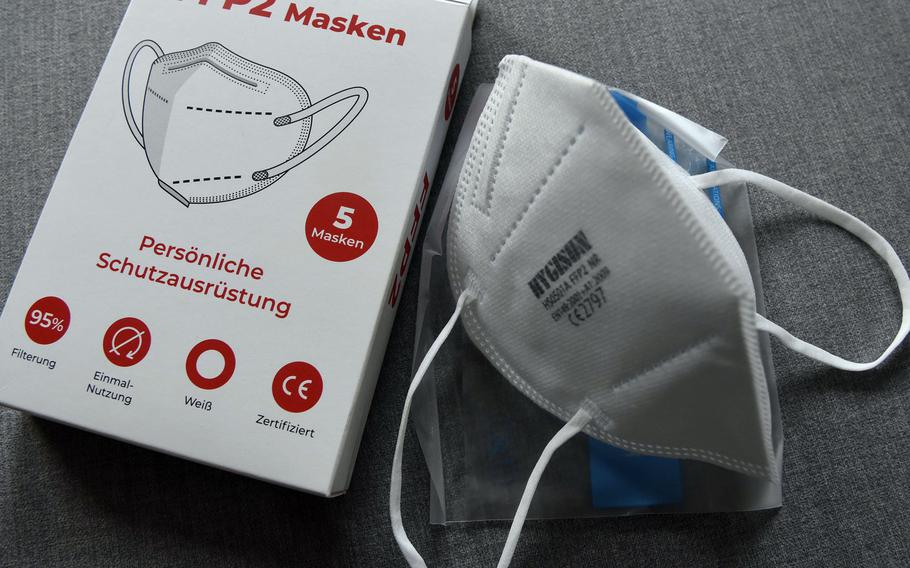Europe
Americans in Germany have to wear medical masks when shopping, using public transport, off base
Stars and Stripes January 20, 2021

A box of medical-grade face masks from a drugstore near Kaiserslautern, Germany. German leaders agreed on Tuesday, Jan. 19, 2021, to require that medical-grade face masks be worn in shops and on public transportation as part of new measures aimed at bringing down high numbers of coronavirus infections. (Jennifer H. Svan/Stars and Stripes)
Stars and Stripes is making stories on the coronavirus pandemic available free of charge. See other free reports here. Sign up for our daily coronavirus newsletter here. Please support our journalism with a subscription.
KAISERSLAUTERN, Germany — U.S. military personnel and their families in Germany will have to wear medical-grade face masks when they go shopping or use public transportation off base, but military leaders had not decided Wednesday if new German rules aimed at curbing the coronavirus will be applied on bases.
“We will provide updated guidance to Air Force members in the KMC to reflect base leadership’s expectations for these changes once a new ordinance is released (by local authorities) and reviewed,” said a spokeswoman for the 86th Airlift Wing, based at Ramstein Air Base near Kaiserslautern.
“We look forward to continuing our partnership with the local community by honoring host nation guidance and fighting this virus together,” she said.
The new face mask requirement is part of a package agreed to by Chancellor Angela Merkel and state leaders Tuesday during an hourslong meeting to hash out ways to bring down high numbers of coronavirus infections.
In addition to requiring medical-grade face masks instead of homemade cloth ones, German leaders agreed to extend a nationwide lockdown and keep schools and child care facilities closed until mid-February. Social gatherings will continue to be limited to one other person from outside a household, and employers have been urged to allow more of their staff to telework, when possible.
Each of Germany's 16 states will decide how to implement the new rules locally, a federal government spokesman told Stars and Stripes. The main one on people's minds was the requirement that medical face coverings, such as FFP2 masks, be worn in public places that might be heavily trafficked, notably shops or public transportation.
FFP2 masks are similar to N95 masks used by U.S. medical workers. They are said to be more effective than cloth face coverings, filtering about 94% of particles, droplets and aerosols from the air if they fit and are used correctly. While they are intended to be worn once and discarded, studies in the U.S. and Europe have found that they can be reused if they are properly sterilized between uses.
The minimum standard of face mask required to protect against the coronavirus, according to the NDR.de website, FFP2 and other medical-grade masks are also more costly than cloth masks. The new rules require only that medical-grade masks be worn, not specifically FFP2 masks.
Like the 86th Airlift Wing, many military commands in Germany said they were waiting to see how state governments would implement the new face mask requirement.
Officials at Spangdahlem Air Base said they were waiting for “clarification from the German health ministry on what masks are actually required and when this goes into effect” before announcing whether the new rule would be applied on base.
While no date has been given for them to take effect, “the plan at the moment is for the new rules (including the obligation to wear a medical-grade mask while shopping or using public transportation) will enter into force on Monday,” David Freichel, spokesman for the Rheinland-Pfalz district, told Stars and Stripes.
Bavaria has required medical masks since Monday, but U.S. bases in the state have so far chosen not to follow suit.
The head of Rheinland-Pfalz, Malu Dreyer, said on Twitter Wednesday that lawmakers in the state, which is home to Ramstein, Spangdahlem and numerous Army facilities, had agreed to adopt “workable measures that are suitable to everyday life” — including the requirement to wear a medical face mask in shops and on public transportation.
The new rules were necessary because of the emergence of new mutations of the virus, including some that are highly contagious, Dreyer said.
One new variant was detected in 35 patients in a clinic in Garmisch-Partenkirchen, Bavaria, on Monday, Deutsche Welle reported. New, highly infectious variants have also been reported in Brazil, South Africa and the United Kingdom. It was unclear if the mutation found in Garmisch was, like those, more easily transmissible, DW cited German health officials as saying.
Over the past seven days, 123 new cases of the virus per 100,000 people were confirmed in Germany, the country's public health agency, the Robert Koch Institute, said on its website. The country needs to get to a seven-day incidence of 50 cases per 100,000 before restrictions can be eased, Merkel has said.
svan.jennifer@stripes.com Twitter: @stripesktown
zeitvogel.karin@stripes.com Twitter: @StripesZeit